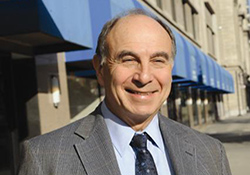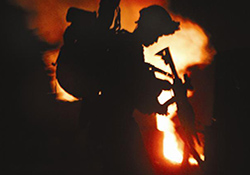Office of Research & Development |
 |
Office of Research & Development |
 |

VA Research Currents archive
Posted September 13, 2013
(Fall 2013 VA Research Currents; online ahead of print)
Confirming the results of earlier trials, researchers with VA and the Department of Defense found that the drug prazosin was effective in reducing nightmares and other symptoms of posttraumatic stress disorder in combat troops and Veterans. The results appear in the September issue of the American Journal of Psychiatry.
Lead author Murray Raskind, MD, says the trial was the "first placebo-controlled trial of a medication for a mental health disorder ever done in an active-duty military population."
Raskind, a psychiatrist at the VA Puget Sound Health Care System, pioneered the use of prazosin for PTSD starting in the late 1990s (see sidebar). Based on strong results from several smaller trials, the drug is already included in VA and Defense clinical guidelines, but researchers continue to explore its risks and benefits. The drug, used for decades to treat hypertension and enlarged prostate, is available as a low-cost generic.
The latest trial involved 65 active-duty troops and two Veterans, all of whom had served in Iraq or Afghanistan and struggled with poor sleep and combat nightmares as part of PTSD.
About half the study volunteers were given prazosin, with an average dose of about 20 milligrams per day, taken in the morning and before bedtime. The others received a placebo.
After 15 weeks, both groups showed improvements, but the gains were significantly greater in the prazosin group. The drug beat placebo on all three main outcomes: a measure of nightmares, one of overall sleep quality, and another of overall daily function. Prazosin also led to greater improvements on additional measures, such as overall PTSD symptoms—particularly hyperarousal, which has been compared to a chronic "fight or flight" state.


VA's Dr. Murray Raskind (top) has pioneered the use of the inexpensive generic drug prazosin to treat trauma nightmares and other symptoms of PTSD in combat Veterans. (Raskind photo: Emerson Sanders; Marine photo: Sgt. Pete Thibodeau)
In an editorial accompanying the study, Matthew Friedman, MD, PhD, of VA's National Center for PTSD, points out that a 10-point drop on the Clinician-Administered PTSD Scale—a common measure of PTSD severity, and the one used in the study—is clinically significant. In the study, the prazosin group showed an average reduction of about 25 points on the measure, compared to 13 points for the placebo group. Friedman calls the results "an important advance." He notes, also, that the use of prazosin is based on a sound theory about the role of the drug in the brain—what he calls "rational pharmacotherapy for PTSD." He contrasts this with research in which drugs are tried because they seem to work for related conditions, but for which no clear mechanism exists that would explain their potential benefit in PTSD.
In the trial, prazosin had no impact on blood pressure, nor did it cause adverse side effects sometimes associated with other psychiatric medications, such as weight gain or sedation. In fact, the active-duty troops in the trial continued their full daily training regimen.
Despite the improvements seen from the drug, only 3 of the 32 prazosin patients achieved full remission. The majority continued to struggle with PTSD symptoms. The study authors propose that combining prazosin with effective psychotherapy—such as prolonged exposure therapy—could result in further improvements.
Overall, says Raskind, there are "great benefits to having a generic, low-cost medicine to treat PTSD that has a proven safety record—it's been used for decades to treat high blood pressure, and to treat enlarged prostate in more than a million men."
The study was supported by VA, the U.S. Army Medical Research and Materiel Command, and the National Institutes of Health.
Another trial of prazosin, funded by VA's Cooperative Studies Program, is still in progress. That study involves more than 300 Veterans at 13 VA medical centers, and results are expected out sometime in 2014.
The men would sleep only four or five hours a night. The bad dreams came with devastating regularity.
The Vietnam Veterans being seen by VA psychiatrist Murray Raskind, MD, in the late 1990s needed a treatment for their ongoing trauma nightmares. Nothing seemed to work. Many had turned to alcohol over the years—anything to help them fall asleep.
Raskind had a theory: If he could make their brains less responsive to norepinephrine, a hormone related to adrenaline, that would ease the nightmares.
"During my treatment work with these Veterans, it became clear to me that the nighttime PTSD symptoms, particularly the nightmares and sleep disturbances—which was the most prominent complaint they had decades after returning from their deployment—seemed to be due to excessive brain responsiveness to norepinephrine. The same seemed to be true of the daytime symptoms such as hypervigilance and irritibability."
Scouring the literature, he learned of a particular class of hypertension drugs that worked by blocking norepinephrine . Only one, prazosin, was able to cross the blood-brain barrier. That drug became his focus.
"I simply started using prazosin clinically with Veterans who had treatment-resistant PTSD trauma nightmares and sleep disruption," recalls Raskind. "It worked dramatically well, where nothing else had been helpful."
Raskind knew he was on to something. "We thought we had something interesting, but we had to prove it in a well-controlled study."
Pilot funding would come from the Seattle Institute for Biomedical and Clinical Research, one of the 82 nonprofits that foster VA research nationwide.
Eileen Lennon, executive director of SIBCR, recalls: "We provided seed money, unrestricted dollars. It was only a small amount until Dr. Raskind was able to get outside funding."
Says Raskind: "It was important in getting the ball rolling. Based on the results of the placebo-controlled pilot study, we were able to apply through SIBCR for larger grants and to perform larger and more definitive trials."
Today, thanks to a series of studies supported by VA, the Department of Defense, and the National Institute of Mental Health, prazosin is part of clinical treatment guidelines for PTSD and traumatic brain injury. The drug, an inexpensive generic, is still being studied, says Raskind, to arrive at a "sharper definition of the range of symptoms that respond to it." Given in small doses throughout the day, prazosin may also help daytime PTSD symptoms, notes Raskind.
Raskind told the success story of his partnership with SIBCR at a recent annual meeting of VA nonprofits. SIBCR executive director Lennon was among those listening. "Everyone was thrilled," she says. "It was an inspiring reminder of why we do what we do."